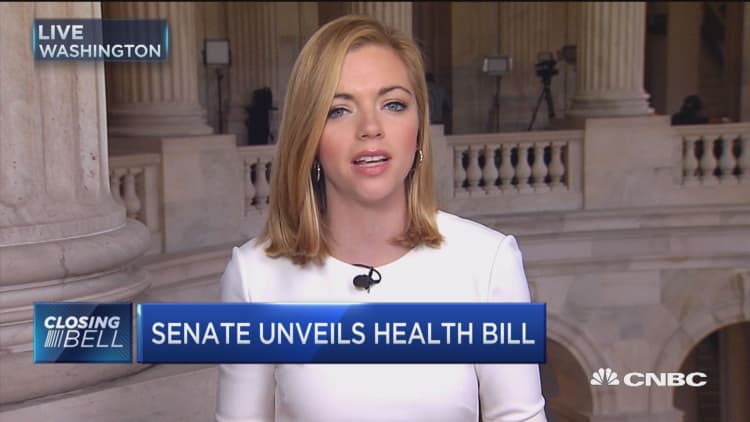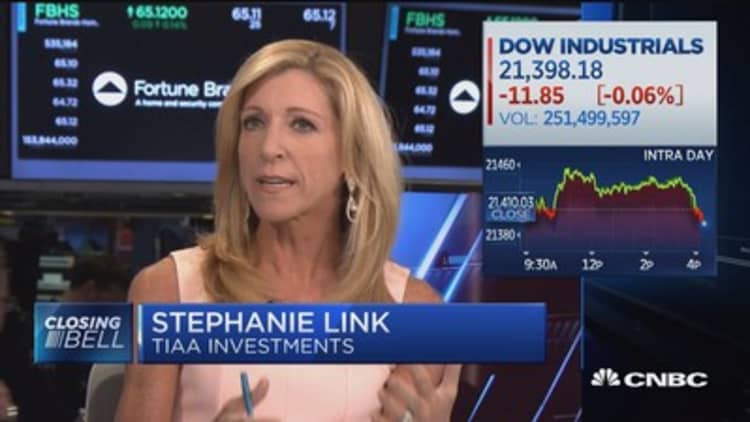
Health insurance and hospital stocks surged following the release of the Senate's Obamacare repeal bill. Analysts say in some ways the Republicans' draft legislation threads the needle on the health industry's concerns, by funding insurance subsidies near term, while pushing out deep cuts to Medicaid seven years from now.
"You preserve Medicaid until 2021 ... and that's good for the hospitals — it retains the status quo," said Sheryl Skolnick, Mizuho Securities' director of research. "It's good for the managed care plans that have Medicaid contracts."
While the Senate bill proposes cuts of more than $800 billion state funding for Medicaid, more or less in line with the House legislation, the risk for the health industry is pushed out over a longer time period.
"Nobody in the market cares what's going to happen seven years from now," Skolnick explained. "It's a lot more clever than the House bill. The House bill was sort of brute force. This has a lot of interesting subtleties. Politically, it's much more masterful."
Some investors may think that by kicking Medicaid cuts down the road, that the Senate bill effectively ensures that they will have to be revisited. From 2003 to 2014, scheduled Medicare cuts in reimbursement for doctors were postponed year after year until they were finally overhauled with permanent funding.
"The near-term aid for the individual market and longer phase-out of Medicaid expansion support the shorter-term outlook and raise the possibility that the most significant coverage cuts may never go into effect post the 2020 election even if repeal is passed now," wrote Evercore ISI analyst Michael Newshel in a note to clients.
Subsidy payments funded through 2021
The Senate bill authorizes the Trump administration to provide insurers in the individual market with stabilization funding of up to $15 billion a year for 2018 and 2019, and $10 billion a year for 2020 and 2021.
Analysts say if the bill is enacted, it will give wide latitude to the Centers for Medicare and Medicaid to continue to make payments on cost-sharing reduction subsidies, which insurers have said is critical for them to limit premium increases on the exchanges, and provide some re-insurance for customers who rack up high-cost medical bills.

"This puts a lot of things in place that should make insurers more comfortable about the exchange business," said Amanda Starc, associate professor of strategy at Northwestern University's Kellogg School of Management. "It may create other problems, but fixes that."
"The Senate bill also repeals all Obamacare industry fees and taxes consistent with the House bill which has been a concern and is a positive for the Managed Care and MedTech names," wrote Leerink Partners health-care analyst Ana Gupte.
Medicaid cuts still a risk for insurers, hospitals
For insurers and hospitals, Medicaid has represented a bigger driver of enrollment growth under Obamacare than the individual market.
Analysts say the GOP Medicaid funding cut to the states for the safety net program of more than $800 billion over the next decade will reduce the number of people covered longer-term, and that will put greater pressure on both insurers and hospital contracts.
"States will look to manage Medicaid more… so insurance companies will continue to play a pretty important role," said Deep Banerjee, health-care ratings analyst at S&P Global Ratings. But "they may want to reduce benefits… or eligibility levels. Something will have to give in the long-term."
S&P's Banerjee said the outlook for hospitals is "somewhat credit negative" if states choose to reduce eligibility for Medicaid and the number of people covered under the program is cut. That will likely result in more people without insurance and more uncompensated care for hospitals.

Ratings analysts at Moody's see both not-for-profit and for profit hospitals facing weaker demand and higher levels of uncompensated care after federal Medicaid cuts begin.
"Transitioning federal Medicaid payments to a per-capita, or block grant system, and freezing Medicaid expansion would reduce the number of people with insurance and increase hospitals' exposure to bad debt and uncompensated care cost," said Daniel Steingart, a senior analyst and vice president at Moody's.
Yet shares of publicly traded hospital operators rallied along with insurers. Community Health and Tenet Healthcare surged around 7 percent following the release of the GOP bill, while HCA Healthcare and HealthSouth saw their shares rise more than 3 percent.
"The (Medicaid) cuts will be bigger… that's not a positive," said Skolnick, but investors are betting the industry will have more time to adjust. "Given the time-value of these events, the market's reacting very positive to that."
Awaiting CBO score
The Congressional Budget Office estimated that market reforms and Medicaid cuts would result in 23 million without insurance coverage over the next ten years, under the American Health Care Act passed in the House. Analysts are not expecting the long-term estimate to change very much under the Senate Bill.
"This bill, ultimately at the end of the day, will result in tens of millions of Americans who will not have health insurance," said Starc.
Yet, the changes to funding for the individual market in the Senate bill could change the picture when it comes to enrollment on the exchanges.
The Senate bill maintains Obamacare's income-based tax credits, cutting eligibility for some middle-class enrollees at 350 percent of the federal poverty level — which is just over $41,500 this year. At the same time, it would extend them to lower-income Americans, who earn less than $11,000 a year, who under the ACA would only gain coverage under the Medicaid Expansion plan.
But the Senate bill repeals the employer and individual mandate, along with penalties, which could have a negative effect on premium prices.
"The elimination of the individual mandate will create the potential for anti-selection in the individual market," said Rebecca Owen, health research actuary with the Society of Actuaries, adding "actuaries will be watching this closely to determine the financial impact, as well as the implications for overall medical risk in the marketplace."
The actuaries point out the CBO score on the Senate bill will key, before a vote. And if the legislation is passed, it still faces another vote in the House.
Watch: Stocks respond to GOP health-care bill



